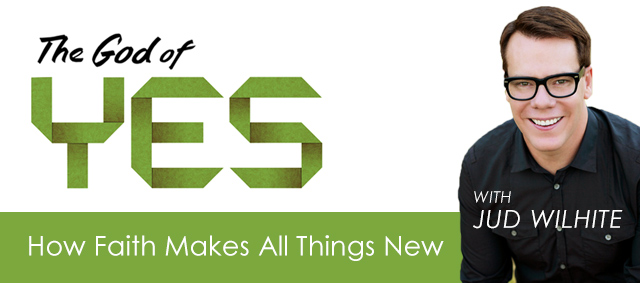About the Author: Jud Wilhite is a New York Times bestselling author, speaker, and the senior pastor of Central Christian Church. Central is recognized as one of the largest and fastest growing congregations in America. Jud is the author of several books including Pursued and Torn. He and his wife, Lori, have two kids and live in the Las Vegas area.
Kevin Syes: Can you tell me about the moment you decided you wanted to write this book?
Jud Wilhite: I’ve wanted to write this book for 15 years. I actually started it over 15 years ago in a word processing software that is non-existent today. I had to buy a tool that would allow me to update the files so I could still use them! It all came out of a spiritual liberation I was experiencing realizing God is really for me and He’s declared a massive Yes over my life through Jesus. Before, I just saw God as the God of no, and it was strangling all the joy out of my life. I thought God was mainly concerned with what I couldn’t do, rather than what I should be doing. I’m glad I didn’t finish the book over 15 years ago as I’ve learned a lot since then and it looks radically different than it would have then. But that was where the desire to write this book first began.
Kevin Syes: What is your process to write books? How do you start preparing? Do you write a little every day? Do you write in the morning or at night?
Jud Wilhite: I used to have a really clear process of writing an hour a day 5 or 6 days a week, usually early in the morning. I did this for years. Hopefully, one day, I’ll settle back into that. But with two young kids and the craziness of life and work, I feel like everything is up for grabs now and not very consistent. I tend to plough along, trying to get in as much time writing as I can. Most of it is uninspired. Then, in a way I’ll never understand, I get in these seasons of inspiration. They may last a day or two, or they may go a couple weeks. I’ve just learned to go with it. In those seasons, I block out everything I possibly can and go until I’m exhausted. I’ll write late at night, early in the morning, over lunch, you name it. It isn’t very consistent anymore, but you gotta do what you can with what you have!
Kevin Syes: Why is it that for so many in our culture they think of Christianity and “no” comes to mind?
Jud Wilhite: Certainly, some of this mindset traces back to the Bible. After all, God did say in the 10 Commandments, “Thou shalt not….” There are plenty of sinful behaviors in the Bible God doesn’t approve of. However, we tend to take all of this and turn it into self-righteous behavior towards others. We focus less on what God is for and more on what He’s against and pretty soon we expand that list to include so many things He never said He was against! It is a sad day when Christianity is primarily known for what it is against rather than what it is for. The whole Bible is a revelation that God is for us and desires a relationship with us. Yet we have an incredible propensity to miss the forest for the trees.
Kevin Syes: Why is it so natural for us to gravitate towards the no’s in the Bible instead of the yes’s?
Jud Wilhite: I lived for years with a pretty distorted view of God and His grace. I believed God would forgive me for my past, but I had to earn my keep and be as good as possible to keep that forgiveness and stay in good with Him. This perspective led to some really unhealthy behaviors and one of them was defining God, and my relationship with Him, through negatives—don’t do this, don’t do that, steer clear of this. A lot of people see God through this lens and sort of just stop there. But there is so much more when you realize all the things God is for. He’s for life, love, work, meaning, joy, and even His “no’s” in the Bible are there to help us live in His yes to all of life.
Kevin Syes: Ecclesiastes is such an interesting and sometimes misunderstood book of the Bible. Why do you think this is?
Jud Wilhite: Ecclesiastes really helped me in one of my darkest times in graduate school when I felt very confused about life, faith, and what the next steps were for me personally. The key interpretive phrase in Ecclesiastes for me was “under the sun,” where the author refers to the meaningless of life “under the sun,” with no regard for the God who is beyond the sun. In this way, He takes us through a life experiment trying to find meaning…Read the rest of the interview at Crossings Books
Also:
Read Kevin’s Interview with Mark Batterson
Read Kevin’s Interview with Matt Chandler
Like this post? Why not share it with a friend?
Tweet








